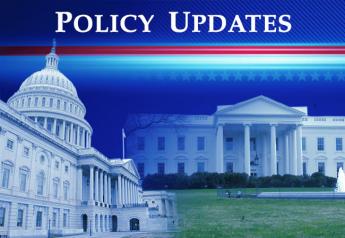Evening Report | December 5, 2023

Check our advice monitor on ProFarmer.com for updates to our marketing plan.
Farmer sentiment improves amid stronger financial conditions... For the second month in a row, farmer sentiment improved as the Purdue University/CME Group Ag Economy Barometer climbed five points to a reading of 115, which was 12% higher than a year earlier. November’s 12-point rise in the Current Conditions Index to a reading of 113 was primarily responsible for this month’s sentiment improvement as the Index of Future Expectations only improved by 2 points. The Current Conditions Index increased 15% and the Future Expectations Index was up 11% compared to November 2022.
The primary driver behind this month’s sentiment improvement was stronger farm financial performance expectations among survey respondents. The Farm Capital Investment Index also rose during November, although respondents who said it was a good time to invest were more likely to point to rising dealer inventories of farm equipment as a reason than strong farm cash flows. Farmers continue to be relatively optimistic about future values for farmland as the short-term farmland index held steady while the long-term index drifted lower.
Click here to view the full report.
Australian meteorologists: El Niño continues; positive IOD likely past its peak... El Niño continues in the tropical Pacific, according to the Australian Bureau of Meteorology. Indicators of the El Niño–Southern Oscillation (ENSO), including tropical Pacific sea surface temperatures (SSTs), cloud, wind and pressure patterns are consistent with El Niño conditions. Climate model forecasts indicate some further warming of central to eastern Pacific SSTs is possible, with SSTs remaining above El Niño thresholds early into the second quarter of 2024.
The bureau says the positive Indian Ocean Dipole (IOD) event also continues. IOD index values have eased from their highest values in October and are unlikely to re-strengthen, meaning the positive IOD event is likely past its peak. All international climate models suggest the positive IOD is likely to ease in December.
The Bureau says, “The long-range forecast for Australia indicates December to February rainfall is likely to be below median across much of northern and western Australia. Warmer days and nights are very likely for almost all of Australia.”
Lawmakers push to allow hot food purchases with SNAP benefits in farm bill... A group of U.S. senators and representatives, comprising one-fifth of the total, is advocating for a change in the rules governing the Supplemental Nutrition Assistance Program (SNAP) as part of the new farm bill. They are urging that the farm bill should permit the purchase of hot foods with food stamps, as the current prohibition on hot food purchases is seen as outdated and not aligned with the dietary and lifestyle needs of American families. The lawmakers argue the ban on hot food purchases disproportionately affects vulnerable Americans, including children, seniors and individuals with disabilities who make up 80% of SNAP participants. They contend that the prohibition “disenfranchises” these individuals, particularly those with mobility issues. The legislators are encouraging the inclusion of the bipartisan and bicameral Hot Foods Act in the new farm bill, which would allow SNAP beneficiaries to use their benefits for hot food purchases.
But USDA recently reaffirmed the ban on using SNAP for hot foods, reiterating that only staple food products are eligible for SNAP participation. Foods like pizza, coffee and fresh salads were specifically mentioned as examples of items that cannot be bought with SNAP benefits.
Lengthy congressional must-do list... The House is only scheduled to be in session this week and next before members leave town until Jan. 9. Here is a rundown on some major topics confronting Congress.
- Little progress has been made in resolving fiscal year (FY) 2024 spending plan details, and Rep. Frank Lucas (R-Okla.) has stated that these spending issues need to be addressed before the House can shift its focus to a new farm bill. Lucas emphasized the importance of first securing government funding through the end of September to align with the timing of the farm bill. This would allow appropriators to resume their work, potentially paving the way for progress on the farm bill. However, the prospects for assembling a FY 2024 spending package for Agriculture appear to be minimal, as the initial version proposed by the House was rejected. Lucas, along with other lawmakers, favors establishing a pathway to conference with the Senate to reach an agreement on the spending package. While Lucas mentioned the possibility of another continuing resolution (CR) to maintain government funding, House Speaker Mike Johnson (R-La.) has previously ruled out such an option. Currently, lawmakers face a Jan. 19 deadline to fund USDA and other government agencies, with another deadline on Feb. 2 for a separate group of agencies. The situation remains uncertain, with funding issues needing resolution before significant progress on the farm bill can be expected.
- Schumer: NDAA talks snared in China-related disputes. Senate Majority Leader Chuck Schumer (D-N.Y.) attributed the impasse in negotiations over a compromise fiscal 2024 defense authorization bill to disagreements over China-related provisions with House Republicans. As a result of these disagreements, it appears that the completion of the bicameral National Defense Authorization Act (NDAA) is unlikely to happen early in the week as initially hoped by proponents of the bill. Instead, it may contribute to the ongoing legislative challenges and logjams on Capitol Hill in the lead-up to the holidays.
- FISA: The House Judiciary Committee is scheduled to consider legislation Wednesday that would add a warrant requirement to a powerful spy authority (section 702 reauthorization/ Foreign Intelligence Surveillance Act), sharpening a divide between privacy-minded lawmakers and the Biden administration.
- Border talks may resume. Senate Republicans are expected to send Democrats a counterproposal in hopes of restarting critical border-security negotiations. Republicans are linking inclusion of border policy reform to further aid to Ukraine, Israel and Taiwan. “Schumer has made hollow threats to force a vote on this $106 billion package while refusing to come to the table and negotiate,” Sen. Roger Marshall (R-Kan.) told Fox News Digital on Monday. “He may be able to bully his caucus into voting for this bogus bill, but Senate Republicans are dug in. We will not budge until meaningful border security policies are secured,” he said. Marshall, who sits on the Senate Committee on the Budget and Committee on Homeland Security & Governmental Affairs, said Republicans “will vote down cloture, and we will not move an inch until there's a bill that puts our national security over foreign countries.”
- The White House’s supplemental request, which was sent to Congress in October, includes $61.4 billion for Ukraine, $14.3 billion for Israel (with $10.6 billion allocated for military aid), $13.6 billion for some border measures such as speeding up asylum processing, and significant investments in Indo-Pacific security assistance, totaling around $7.4 billion. Additionally, there’s $9 billion earmarked for humanitarian aid in Ukraine, Israel and Gaza.
- Senate Republicans are softening their criticism of the House’s efforts to potentially impeach President Biden. While some Senate Republicans are not enthusiastic about holding a Biden impeachment trial, they are not actively discouraging the House from voting to authorize an impeachment inquiry. House Speaker Mike Johnson (R-La.) is proceeding with plans for an inquiry vote, which his predecessor, Rep. Kevin McCarthy (R-Calif.), avoided. Sen. John Cornyn (R-Texas) has defended such a vote, suggesting it could provide House Republican-led committees with more leverage in court regarding subpoenas related to Biden’s actions.
- Republicans assert Hunter Biden payments tie him to father’s Chinese business. Republicans claimed that payments made by Hunter Biden to his father, Joe Biden, are evidence of a connection between Joe Biden and his son’s Chinese business activities. According to documents released by the House Committee on Oversight and Accountability, Hunter Biden made three payments to his father in 2018, totaling slightly more than $4,000. These payments came from a business account associated with Hunter Biden's Chinese business dealings. However, Democrats have a different interpretation of these documents. They argue that the payments were simply Hunter Biden reimbursing his father, Joe Biden, who was not in office at the time. The reimbursement was for certain expenses, such as payments Joe Biden was making on a truck that Hunter Biden was using.
China’s hidden debt problem coming to a head... China is currently facing a significant and potentially dangerous issue related to its hidden debt problem, the Wall Street Journal reports. This problem has been building up for years as cities and provinces in the country engaged in extensive borrowing and spending without proper oversight. Key points:
- Massive hidden debt: Various sources, including the International Monetary Fund (IMF) and Wall Street banks, estimate the total amount of off-balance-sheet government debt in China is somewhere between $7 trillion to $11 trillion. The exact figure remains uncertain due to the lack of transparency.
- Unsustainability: Over the past year, it has become increasingly evident that the debt levels incurred by local governments in China are unsustainable. This means that these governments may struggle to meet their debt obligations.
- High default risk: Economists have identified a significant portion of this hidden debt, with estimates ranging from $400 billion to over $800 billion, as particularly problematic and at a high risk of default. This poses a considerable threat to China’s financial stability.
J.P. Morgan: Bonds more competitive in 2024... J.P. Morgan Private Bank’s outlook for 2024 suggests higher interest rates have made bonds more competitive with stocks, similar to the situation before the Global Financial Crisis. A summary of their perspective:
- Bonds vs. stocks: The report indicates that due to higher interest rates, bonds have become a more attractive investment option compared to stocks. This shift in relative attractiveness is reminiscent of the period before the Global Financial Crisis.
- Stability and income: Jacob Manoukian, head of U.S. investment strategy at J.P. Morgan Private Bank, emphasizes the role of bonds in providing stability and generating income. Bonds offer coupon payments that generate consistent income for investors. Moreover, when economic growth slows, bond prices tend to rise, offering potential capital appreciation.
- Favorable position for bonds: J.P. Morgan Private Bank believes that the recent increase in bond yields has positioned bonds to excel in terms of both stability and income. This suggests that bonds could be a valuable asset class for investors in the current economic environment.






